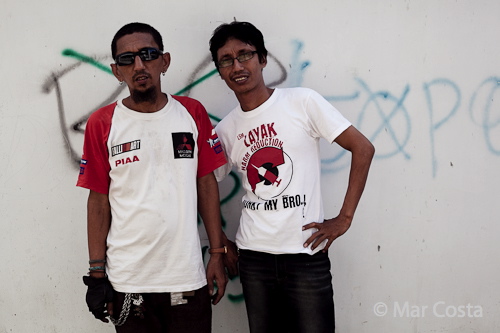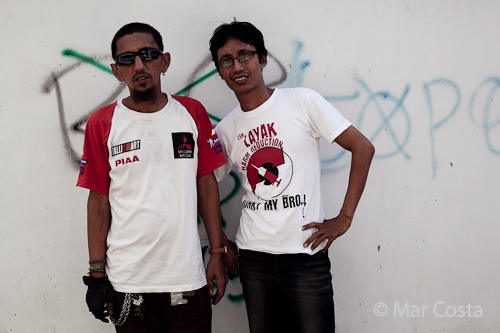
Jakarta, Indonesia-
“I just want the drug users to get what they deserve.”
Herru Pribadi does not mean this as a vindictive demand for punishment, but rather as a plea for just and equal treatment in accordance with the law. Pribadi, a paralegal for drug users in Jakarta, believes that they deserve the right to an attorney, to know their charge, and most importantly, to be given a fair and proportional sentence. These are their legal rights, and for any democratic nation, the rights of the accused act as a litmus test of the degree to which a society respects rights and the rule of law. For Pribadi and other paralegals trained by officials at Lembaga Bantuan Hukum (LBH) Masyarakat, each day is a struggle to ensure their clients get what they deserve.
Similar to the work being done in her 2010 JusticeMakers Project, Ajeng Larasati and her colleagues at LBH Masyarakat place emphasis on reaching out to communities in addition to training community leaders to educate others within the community about their legal rights. They work extensively in the drug user community in Jakarta, a group that is often marginalized by society. LBH represents drug users in the court system, but have also been successful in a program that trains Jakartans to be paralegals and assist other individuals in legal matters.
Pribadi met LBH Masyarakat in June of 2008 at the annual day for Commemoration of Victims of Torture. He worked as a community outreach officer for drug users, providing them with harm reduction practices, health education, and sanitary essentials like condoms and clean needles. He was also coordinating a program known as Forum Korban Napza (Forum for Victims of Drugs) or Forkon, in order to advocate for drug user legal rights and assist and educate the community. Upon meeting representatives from LBH Masyarakat, both parties realized that they could achieve great things through cooperation. Since then, LBH Masyarakat has assisted Pribadi in training many community members to be paralegals. Now, he acts as their leader.

Two of the Paralegals trained by LBH Masyarakat relax after a day of counseling. (Photo by Mar Costa)
According to Pribadi, drug users face difficulties on many fronts. Many drug users are unaware of the basic legal rights to which they are guaranteed, as well as the fair punishments the law ought to uphold. This effort is made more difficult by the stigma society holds against lawyers who represent the drug users. “They are seen as rule-breakers,” he says, “and many people think that by defending them, you are a rule-breaker as well.” Thirdly, the judicial system and law officers are often equally unaware of new legislation being passed, making it nearly impossible to set standards or precedents. For example, many drug users charged with crime are non-violent offenders, often caught in a medical addiction to the substance. “The system has difficulty differentiating between users, addicts, and dealers,” says Pribadi. Nonviolent addicts are too commonly sent to a long prison sentence rather than given a small sentence or medical rehabilitation is far too common.
In late 2009, the government passed a Narcotics Law mandating that if a drug user is addicted to the substance and provided adequate proof, the court should strongly consider rehabilitation as an alternative to prison sentence punishment. According to information from the National Narcotics Board in April 2010, there have been 28,000 drug related cases in the past year. A large amount of these cases involve addictive drug substances. Of those 28,000 cases, only 9 individuals were sent to rehab, or 0.032 percent of the total cases. It seems unlikely that those 9 were the only individuals who were addicted, and both Pribadi and Larasati agree, saying that “most of the drug users are addicted and should be sent to rehab.”
What then, is preventing proper and lawful sentencing? Pribadi believes that stigmas against drug users must be changed throughout the city, but not just in a general manner. Lawyers and Judges must see the drug users as accused persons, not guilty individuals before the trial takes place. Even more importantly, there needs to be better socialization of law. What is the use of a law stating that those who are addicted should be considered for rehab if the law is not followed by the system?
Despite the .03 percent rehabilitation rate, there is still promise for the future. As noted in a previous post, Larasati and LBH Masyarakat assisted one user who was facing 20 years in prison. Because they were able to prove that he was an addict who wished to beat his disease and become a productive member of society, he was sentenced to rehab. LBH Masyarakat was successful in placing another client in rehab, giving them two out of the nine successful cases. Though the current system makes it difficult, legal success is still possible.
Perhaps this is what Pribadi means by getting the drug users what they deserve. Certainly, they have broken the law and deserve to be punished, but they deserve to be punished in a fair manner and to a fair sentence. When asked about his clients’ faith in a society that sends 99.97 percent of drug users to jail, Pribadi said that to the users, all hope is not lost. “When we counsel drug users, they are often excited to see what the law says they are allotted versus what they had expected from the reality of other drug cases.” Through willing clients who are eager to be educated on their legal rights, lawyers who are not afraid to defend a person based on their crime, and a society that socializes the laws that are passed in the legislature, there is hope that legal rights will no longer elude the drug users of Jakarta.